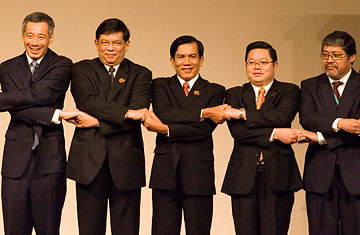
ASEAN ministers join hands during the opening ceremony of the 41st ASEAN Ministerial Meeting in Singapore on July 21
A new charter for the Association of Southeast Asian Nations (ASEAN) was signed on July 21 with much flourish and a promise to "strengthen democracy, enhance good governance and the rule of law, and to promote and protect human rights and fundamental freedoms." An admirable undertaking, except that the person formally ratifying the charter was Nyan Win, the Foreign Minister of Burma, a country with one of the world's most appalling human-rights records. Indeed, Burma's signing of the document during this year's ASEAN ministerial meeting in Singapore threatens to render meaningless the lofty humanitarian goals set by the organization's 10 member nations.
Burma's economy limps along with help from its regional neighbors, including ASEAN members such as Thailand and Singapore as well as non-members India and China. Critics of ASEAN say the forum has not done enough to pressure Burma to end human-rights abuses. Although Thailand, Indonesia and the Philippines indicated earlier that they might delay their own ratifications of the charter until Burma cleans up its human-rights record, they have been less publicly forceful in their demands since then. While the U.S. and the European Union have tightened sanctions against Burma's ruling military junta since it violently crushed monk-led protests last year, ASEAN has continued with a "constructive engagement" approach that it hopes will, through dialogue and investment, convince Burma's leaders to treat its people more kindly.
So far, the approach has failed. Since Burma's junta took over the country, also known as Myanmar, in 1962, its people have gone from some of the richest in Asia to among its poorest. An election won by the opposition was duly ignored. Political prisoners crowd jails. The most recent example of the generals' callousness came in May when Cyclone Nargis devastated the country's Irrawaddy Delta, leaving 138,000 people dead or missing and causing $4 billion in damage, according to an international assessment released on July 21. Yet instead of promptly accepting offers of help from around the world, the regime spent weeks refusing visas to foreign aid workers and setting up roadblocks to stop international agencies from delivering relief supplies. Even today, after Burma promised in an ASEAN-brokered deal to stop impeding foreign aid groups, non-Burmese still have to apply for special permits from the country's Ministry of Defense to visit the delta.
So for ASEAN's nine other members not to at least arch an eyebrow when Burma signed the charter is nothing short of willful ignorance. Yes, ASEAN did speak forcefully on July 20 when Singaporean Foreign Minister George Yeo said the bloc's members felt "deep disappointment" that Burma in May prolonged the detention of opposition figurehead and Nobel laureate Aung San Suu Kyi. But any mention of that negative emotion was excised from the formal communiqué issued by ASEAN the following day. And an initial flurry of excitement caused by Yeo when he said that his Burmese counterpart had told him Suu Kyi might possibly be released in six months' time turned out to be a misunderstanding. A clarification was quickly issued in which the Burmese government was quoted as saying the earliest Suu Kyi might be freed would be after May 2009.
Of course, ASEAN's kid-gloves approach toward Burma isn't unique. Another item on the agenda at this year's meeting? A treaty of amity and cooperation with none other than North Korea. After buddying up to Burma for so long, ASEAN, it seems, isn't too picky about its friends.
